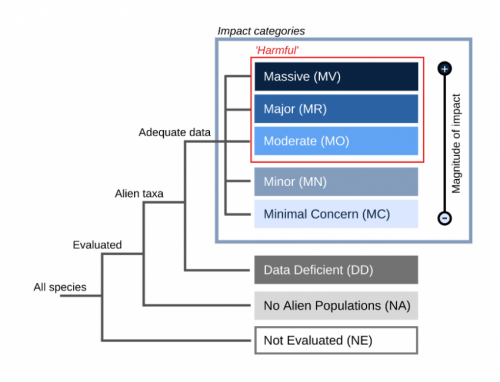IUCN Standard to support global action on invasive alien species
IUCN Sept 15 launched a global standard for classifying the severity and type of impacts caused by alien species, known as the Environmental Impact Classification for Alien Taxa (EICAT). This tool will alert scientists, conservation practitioners and policy makers to the potential consequences of invasive alien species, guiding the development of prevention and mitigation measures.

“Addressing the impacts of invasive alien species is vital to tackling escalating biodiversity loss and the extinction crisis, and their significant effects on economies, livelihoods and wellbeing,” said Dr Jane Smart, Global Director of the IUCN Biodiversity Conservation Group. “This new tool will provide key information for national, regional and global institutions to make decisions on where to target their resources, supporting the scaling up of conservation efforts worldwide.”
The growing movement of goods and people around the globe is introducing animals, fungi, plants and pathogens to areas outside their natural range at an ever-increasing rate. These alien species can become invasive, negatively impacting their new environment, threatening biodiversity and ecosystems. According to the IUCN Red List of Threatened SpeciesTM and the 2019 IPBES Global Assessment Report on Biodiversity and Ecosystem Services, invasive alien species are one of the main direct drivers of biodiversity loss and species extinctions. Furthermore, they are one of the most serious and rapidly growing threats to food, health and livelihood security.
However, resources to prevent introductions and manage established invasive alien species are scarce. It is therefore critical to prioritise responding to those invasive alien species that would potentially lead to the most harmful impacts.
EICAT aims to support the identification of priority invasive alien species to address. It is a simple and objective standard that classifies alien species into impact categories based on evidence of the harm they cause. The five categories, in order of increasing impact, are Minimal Concern, Minor, Moderate, Major and Massive. Species in the latter three categories are considered ‘harmful’. The scheme is applicable at national, regional and global levels; all EICAT assessments undertaken at the global level will be available through IUCN’s Global Invasive Species Database.
Source: International Union for Conservation of Nature
- 437 reads
Human Rights
Fostering a More Humane World: The 28th Eurasian Economic Summi

Conscience, Hope, and Action: Keys to Global Peace and Sustainability

Ringing FOWPAL’s Peace Bell for the World:Nobel Peace Prize Laureates’ Visions and Actions

Protecting the World’s Cultural Diversity for a Sustainable Future

Puppet Show I International Friendship Day 2020

